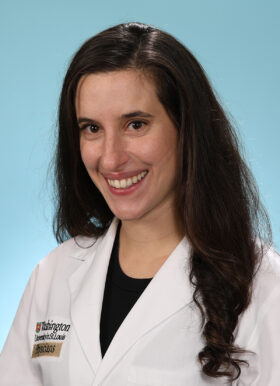Zeynep G. Gul, MD

Zeynep G. Gul, MD is a urologist who specializes in urologic cancers.
Please call 314-362-8200 for an appointment.
What during your training led you to choose your specialty?
During medical training, a primary decision a student makes is choosing between a surgical or non-surgical specialty. Non-surgical specialties generally involve spending more time in the office with patients and forming long-term, personal relationships. Surgeons often only see a patient around the time of the operation but can immediately and directly improve a patient’s life. Urology was the first specialty I discovered in which it was possible to do both.
What brought you to Washington University?
I always knew that I wanted to work at an academic center where I would have the opportunity to both conduct research and work with residents. Getting a job at Washington University is the pinnacle of academic medicine. Our School of Medicine and Barnes-Jewish Hospital are consistently ranked among the top in the country. Washington University is also one of the largest recipients of NIH funding and the Siteman Cancer Center is a part of the National Comprehensive Cancer Network, which is comprised of the top 33 cancer centers in the country. The resources for both research and patient care are unmatched. Every day, I get to work with and learn from leaders across all fields of medicine. There is no better place to be a physician.
Which aspect of your practice is most interesting?
Urologic cancer care is multidisciplinary. This means that a team of doctors such as urologists, radiation oncologists and medical oncologists work together to treat a patient. We have a standing meeting, called tumor board, during which we develop and discuss treatment plans for more complicated patients, who we often see here at Washington University. Getting to work with other physicians and learn from them is one of my favorite parts of my job.
What do you want your patients to know about urologic cancers?
I want patients to know that a vast majority of the time, urologic cancers can be treated successfully. Most urologic cancers can be cured with surgery or combined therapy (surgery and radiation or other treatments).
In what ways is your approach to patient care unique?
Treatments have varying effectiveness, side effects and are associated with different risks. I believe it is important to explain this to patients and understand their preferences. The best treatment for any patient depends on what they think is the best outcome and how they feel about the side effects.
Are there any other new developments in your field that you are excited about?
There has been a lot of work done recently on non-operative, bladder-preserving treatment for patients with bladder cancer. Historically, the only effective treatment for non-muscle invasive bladder cancer was drug therapy with pain relief. Over the last few years, several new treatments have been identified and more are being in investigated with promising preliminary results. At Washington University we are participating in several clinical trials to bring these treatments to our patients sooner.
Where are you from?
I was born in California, but grew up in New Jersey. I went to Princeton for college and Case Western School of Medicine for my medical degree. I completed residency at the Icahn School of Medicine at Mount Sinai and fellowship at the University of Pittsburgh Medical Center.
Which particular award or achievement is most gratifying?
My first research grant, The American Urologic Association and Urologic Care Foundation research scholar award. It is the foundation for my development as a physician-scientist.
If you weren’t a doctor, what would you like to be doing?
I majored in economics in college, so most likely I would be doing something in the business world.